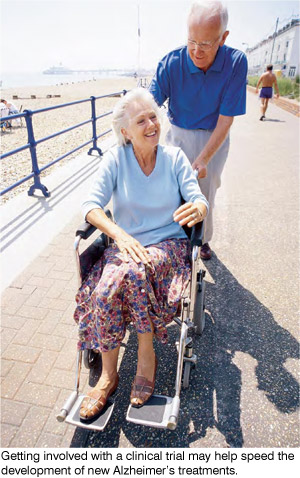August 13, 2009
Among the many decisions you will face as a patient (or caregiver) dealing with Alzheimer’s disease (AD) is whether or not to participate in a clinical trial. Clinical trials help scientists understand how AD affects the brain and facilitate the testing of breakthroughs in treatment and prevention. Before joining a clinical trial, patients and their caregivers should understand as much as possible about the specific study and its potential impact. Making a Difference  A devastating neurological disorder, AD affects more than 30 million people worldwide and results in more than $100 billion in annual patient care costs, said Michael S. Rafii, MD, PhD, director of the Memory Disorders Clinic at the University of California, San Diego (UCSD). Yet treatment and preventive measures approved for the disease are limited. “Current FDAapproved drugs for AD do not prevent or reverse the disease, and provide only modest symptomatic benefits,” said Dr. Rafii, who is also assistant professor of neurosciences at UCSD and associate medical director of the Alzheimer’s Disease Cooperative Study, a national research consortium between the National Institute on Aging and UCSD. As scientists continue to make advances and explore new approaches for AD, the demand for study participants has increased. By participating in a clinical study, patients have the opportunity to help some of these new treatments, preventive strategies and diagnostic tools become a reality. Many of the people who participate in clinical trials are motivated by their desire to help others and the hope of eventually curing the disease. “It’s about taking a proactive stance versus helplessness and hopelessness—it’s about altruism and concern for your children and grandchildren,” said Lisa P. Gwyther, MSW, LCSW, education director at the Bryan Alzheimer’s Research Center at Duke Medical Center. “It’s also about access to the best and brightest experts who are genuinely interested in your condition and your response. And it’s a chance to make a difference and be part of an ‘answer’ and not just part of ‘the problem,’” added Gwyther, co-author of The Alzheimer’s Action Plan (2008). The reasons for joining an AD study are as unique as the participants themselves. “An individual’s decision to enter a clinical trial is a very personal one and there are a variety of reasons for considering taking part in a study,” said Dr. Rafii. “Having hope for a future cure, feeling better, and contributing to research and society are some personal reasons participants enter trials. Participants who enter clinical trials also receive access to cutting-edge treatments before they are readily available to the general public.” How Do Trials Work? Each clinical trial is unique, and its process depends on the research being tested. The research team often includes doctors, nurses, social workers and other health care professionals. Clinical trials are sponsored by health care institutions, government agencies, pharmaceutical companies, individual physicians, and medical device companies. Studies take place in hospitals, universities, doctors’ offices and community clinics. As you evaluate a study, be sure to find out the location of the study site and how frequently your attendance will be needed. All clinical trials are based on their own protocol. This set of rules defines what types of people are sought to participate in the trial; the schedule of tests, procedures, medications and dosages; and the length of the study. If you participate in a clinical study, you will likely be seen regularly by the research staff to monitor your health and to determine the safety and effectiveness of the treatment. Some clinical trials involve more tests and doctor visits than you would normally have for your illness or condition.
A devastating neurological disorder, AD affects more than 30 million people worldwide and results in more than $100 billion in annual patient care costs, said Michael S. Rafii, MD, PhD, director of the Memory Disorders Clinic at the University of California, San Diego (UCSD). Yet treatment and preventive measures approved for the disease are limited. “Current FDAapproved drugs for AD do not prevent or reverse the disease, and provide only modest symptomatic benefits,” said Dr. Rafii, who is also assistant professor of neurosciences at UCSD and associate medical director of the Alzheimer’s Disease Cooperative Study, a national research consortium between the National Institute on Aging and UCSD. As scientists continue to make advances and explore new approaches for AD, the demand for study participants has increased. By participating in a clinical study, patients have the opportunity to help some of these new treatments, preventive strategies and diagnostic tools become a reality. Many of the people who participate in clinical trials are motivated by their desire to help others and the hope of eventually curing the disease. “It’s about taking a proactive stance versus helplessness and hopelessness—it’s about altruism and concern for your children and grandchildren,” said Lisa P. Gwyther, MSW, LCSW, education director at the Bryan Alzheimer’s Research Center at Duke Medical Center. “It’s also about access to the best and brightest experts who are genuinely interested in your condition and your response. And it’s a chance to make a difference and be part of an ‘answer’ and not just part of ‘the problem,’” added Gwyther, co-author of The Alzheimer’s Action Plan (2008). The reasons for joining an AD study are as unique as the participants themselves. “An individual’s decision to enter a clinical trial is a very personal one and there are a variety of reasons for considering taking part in a study,” said Dr. Rafii. “Having hope for a future cure, feeling better, and contributing to research and society are some personal reasons participants enter trials. Participants who enter clinical trials also receive access to cutting-edge treatments before they are readily available to the general public.” How Do Trials Work? Each clinical trial is unique, and its process depends on the research being tested. The research team often includes doctors, nurses, social workers and other health care professionals. Clinical trials are sponsored by health care institutions, government agencies, pharmaceutical companies, individual physicians, and medical device companies. Studies take place in hospitals, universities, doctors’ offices and community clinics. As you evaluate a study, be sure to find out the location of the study site and how frequently your attendance will be needed. All clinical trials are based on their own protocol. This set of rules defines what types of people are sought to participate in the trial; the schedule of tests, procedures, medications and dosages; and the length of the study. If you participate in a clinical study, you will likely be seen regularly by the research staff to monitor your health and to determine the safety and effectiveness of the treatment. Some clinical trials involve more tests and doctor visits than you would normally have for your illness or condition.  In many AD trials, the patient is essentially a passive bystander and the processing of information about the trial and decision-making are the responsibility of the caregiver, spouse, next-of-kin or person designated with power of attorney. This elevates the role and responsibilities of the caregiver and should be considered before joining a trial. “The caregiver usually accompanies the subject to all visits for the duration of the study and provides a wealth of information with regards to how a patient is doing while on a study drug,” explained Dr. Rafii. “Alzheimer’s disease affects a patient’s memory such that the caregiver’s account of how things are going helps clinical researchers understand the effects of the drug, and any benefits derived, in addition to those measured as part of the clinical trial protocol.” Some clinical trials will pay participants, while others do not. In some programs, researchers will reimburse you for expenses associated with participating in the research, such as transportation costs, child care, meals and accommodations. You are ultimately in control of your participation and you can leave a clinical trial at any time. If you plan to stop participating, let the research team know your reasons. Risks vs. Benefits As you consider participating in a study, evaluate the benefits and risks specific to your participation. Benefits include taking an active role in your health care, gaining access to the most advanced treatments available, receiving exceptional medical care at top facilities, and helping others by contributing to research advancement. Weighing the Decision
In many AD trials, the patient is essentially a passive bystander and the processing of information about the trial and decision-making are the responsibility of the caregiver, spouse, next-of-kin or person designated with power of attorney. This elevates the role and responsibilities of the caregiver and should be considered before joining a trial. “The caregiver usually accompanies the subject to all visits for the duration of the study and provides a wealth of information with regards to how a patient is doing while on a study drug,” explained Dr. Rafii. “Alzheimer’s disease affects a patient’s memory such that the caregiver’s account of how things are going helps clinical researchers understand the effects of the drug, and any benefits derived, in addition to those measured as part of the clinical trial protocol.” Some clinical trials will pay participants, while others do not. In some programs, researchers will reimburse you for expenses associated with participating in the research, such as transportation costs, child care, meals and accommodations. You are ultimately in control of your participation and you can leave a clinical trial at any time. If you plan to stop participating, let the research team know your reasons. Risks vs. Benefits As you consider participating in a study, evaluate the benefits and risks specific to your participation. Benefits include taking an active role in your health care, gaining access to the most advanced treatments available, receiving exceptional medical care at top facilities, and helping others by contributing to research advancement. Weighing the Decision  When evaluating the potential risks a clinical trial poses to you or your loved one, consider there may be side effects or adverse reactions to medications or treatments; the treatment may not be effective for you; and the study’s protocol may require a lot of time for trips to the study site, treatments, hospital stays or complex dosage requirements. Informed consent is the critical process of learning key facts about a study before deciding whether to volunteer. The government has strict guidelines and safeguards to protect people who choose to participate in clinical trials and requires potential participants to be given complete information about a study in writing. You should also ask the research team to explain all the risks and possible benefits and answer any of your questions before you make a decision. Informed consent is a process that continues throughout the study. Participants should feel free to ask the research team questions before, during and after the study. If the patient suffering from AD is not mentally capable of giving consent, the informed consent process must be conducted by next-of-kin or the person granted power of attorney.
When evaluating the potential risks a clinical trial poses to you or your loved one, consider there may be side effects or adverse reactions to medications or treatments; the treatment may not be effective for you; and the study’s protocol may require a lot of time for trips to the study site, treatments, hospital stays or complex dosage requirements. Informed consent is the critical process of learning key facts about a study before deciding whether to volunteer. The government has strict guidelines and safeguards to protect people who choose to participate in clinical trials and requires potential participants to be given complete information about a study in writing. You should also ask the research team to explain all the risks and possible benefits and answer any of your questions before you make a decision. Informed consent is a process that continues throughout the study. Participants should feel free to ask the research team questions before, during and after the study. If the patient suffering from AD is not mentally capable of giving consent, the informed consent process must be conducted by next-of-kin or the person granted power of attorney.











